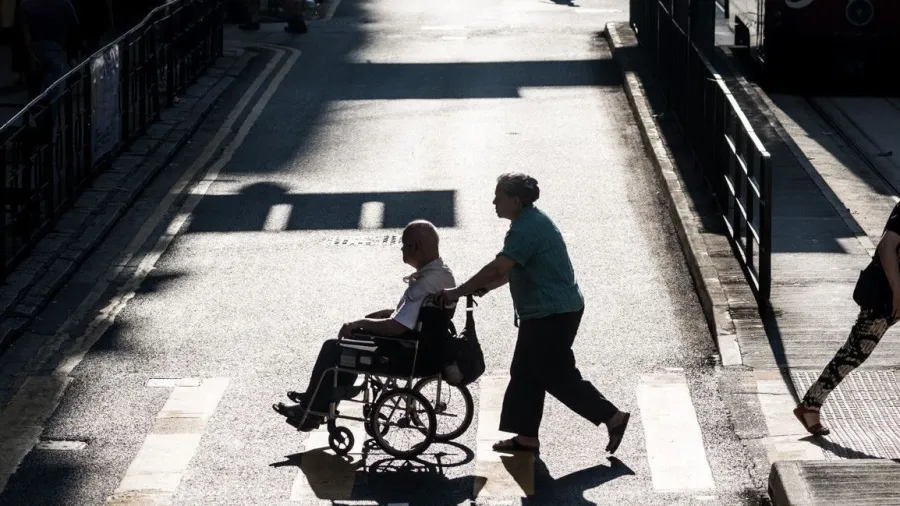
Why GBA might not be ideal for some of HK’s grandmas and grandpas
HK retirees may be reluctant to move to the Guangdong Bay Area because of elderly home quality and wanting to stay in their communities.
Concerns linger on healthcare quality and distance from senior population’s communities if they relocate to the Guangdong Bay Area (GBA), which is seen to resolve a mismatch of supply and demand in elderly care services and infrastructure. Roland Berger’s data showed that private RCHE for the elderly are nearly congested, with 71% of RCHE occupied.
To resolve this, Hong Kong’s healthcare should increase geriatric departments and hospitals whilst employing AI and wearable devices for preventive care.
Interviewed by Healthcare Asia recently, Alan Yau, KPMG China’s head of real estate in Hong Kong, gave a litany of these concerns: “Is it convenient for me to come back to Hong Kong? Would it be a very long distance? Also, the family matters, like how often my family would come up to see me.”
What Yau sees coming, though, is that GBA and Hong Kong connectivity will be improved due to a high-speed railway in the works.
Yoshihiro Suwa, a partner and head of life sciences Southeast Asia at Roland Berger, cited a similar case in Johor Bahru, a Malaysian city located near Singapore and is targeted as an area to support the city-state’s shortage of elderly care resources.
Whilst the cost of living is cheaper in Johor Bahru, Suwa said ghost buildings abound because people do not want to move away from their respective communities. “It’s not that easy to convince everybody to move to GBA and this Johor Bahru case could be one of the interesting benchmarks to look at,” Suwa told Healthcare Asia magazine.
Laurent Doucet, a partner and head of Roland Berger’s Hong Kong office, said that there were initiatives in place to set up quality medical services from Hong Kong in the GBA in 2019, but their delivery was delayed due to protests and the COVID-19 pandemic. Doucet said all these initiatives need further development to be implemented.
Kevin Chang, head of Bain’s Greater China Healthcare and Life Sciences, opportunities from the GBA include joint training, staff exchange programmes, recruitment, and collaborative research on geriatric care.
But he noted that there is a need for harmonised licensing and accreditation to facilitate the mutual recognition of qualifications and credentials of healthcare professionals across the GBA.
This also ensures that care facilities across the region adhere to quality standards. There should also be consistent consumer protection laws in place to safeguard the rights of the elderly, said Chang.
“Whether it's regarding fees, service quality, or dispute resolution, the elderly and their families can have clarity and assurance,” said Chang.
Meanwhile, Arnaud Bauer, head of healthcare services and healthcare M&A for Southeast Asia and partner at L.E.K Consulting, said only part of the elderly care gap can be fixed by relocating them.
Bauer said there were even cases in the UK where the elderly were being relocated to Thailand due to the more ideal ratio of healthcare staff to patients. This, however, is less of an option for the elderly getting to a higher state of dependency, because they would rather be closer to family and friends.
“The displacement of those elders to a different market, even if geographically close, is only a temporary solution for those that are still autonomous enough, it cannot cater to someone throughout their end of life,” he told Healthcare Asia.
Geriatric departments
Chang said geriatric departments should be established within hospital facilities to offer such services as fall prevention, dementia care, and management of chronic diseases.
“A good geriatric department in the hospitals is not just focusing on treatment. It needs to be connected to the prevention, the diagnosing the maintenance of well-being, before the patient becomes an actual patient,” said Chang.
He also suggested post-hospitalisation translational care to reduce the risk of readmission. These care units will focus on patients who have been discharged but are not yet ready to return to their homes or transfer to a long-term care facility.
Since Hong Kong’s geriatric population is expected to be over 46.3% by 2050, figures from Bain showed that demand for elderly homes will rise whilst supply will grow by only 0.24%.
KPMG’s Yau acknowledged that infrastructure, particularly the strategic building of the geriatric care properties within medical facilities, is a key element for successful elderly care.
Yau pointed out as an example the Hong Kong Housing Society, which works with private hospitals to provide among others a Chinese medical service within the elderly care facility.
High-end properties and elderly hospitals
According to KPMG, high-end elderly properties for Hong Kong’s oldest population are insufficient. Yau said around 95% of elderly properties are basic living facilities whilst only 5% are high quality.
The main difference is that high-end properties offer more privacy, having dedicated bathrooms and kitchens per occupant. These properties also have better communities within the premises such as gyms, cinemas, and food & beverage outlets.
In contrast, basic elderly properties usually feature a shared bedroom and toilet. There are also limited facilities within the premises to keep elderly people interested, said Yau.
On hospital care, L.E.K. Consulting’s Bauer said hospitals can play a role in treating chronically ill or highly dependent seniors but cannot replace residential care settings.
Amongst the key factors of increasing dependence is the rising prevalence of dementia amongst senior citizens, Bauer said it is at 5% to 8% among those aged over 65 and even higher at 20% to 30% when they reach 80. In addition, the hospital setting is not well suited for long-term care.
“In addition to being generally a care setting that is not well regarded by the elders, we’ve seen in countless studies evidencing,” he added.
For Bain’s Chang, there is always a need to increase geriatric hospitals, but Hong Kong should rethink its approach to hospital care by offering healthcare outside hospital walls.
Roland Berger’s data showed that Hong Kong has 20 geriatric hospitals, with beds that can fill up to 20,000 patients but this is still not enough.
Senior care outside hospital walls
Wearable devices and AI will also help in preventive care to track a senior citizen’s lifestyle or their medical history, said Chang.
Hong Kong may also emulate Australia’s “My Aged Care” where hospitals can create digital platforms that the seniors can access for booking medical appointments and finding community events tailored for them. Mobile clinics can also help reach seniors who have mobility issues or those who live in remote areas, said Chang.
Another way is that there must also be hospital partnerships with residential care homes to ensure that these homes are equipped to provide medical care in line with hospital standards, he said. This involves periodic visits by hospital staff, training home care staff, or setting up telemedicine facilities in these homes.
Doucet of Roland Berger said Hong Kong needs to deploy smart robotic care and remote care technologies to support the elderly in living independently and securely in their homes. These technologies include wireless sensors for monitoring and micro-trackers for persons with dementia.
From a management firm’s perspective, L.E.K. Consulting said hospitals can draw inspiration from iHealth Screen, an easy-interface app developed by the Hong Kong Jockey Club CADENZA for health screening tests that cover 11 common health topics on older adults.
“It could definitely be seen as a way for healthcare providers to be a part of this market as well, providing their own app and encouraging patients in coming over to seek multidisciplinary assessment,” Bauer explained.
Land premium discounts
Another strategy to solve the elderly care home scarcity is for the government to offer discounts on land premiums so that investors can receive better returns, Yau said.
“Hong Kong is a very expensive city, whereby if you build an [elderly home], it takes 30 or 40 years to get the return,” he said.
Doucet agreed that government incentives will address the nearly congested occupancy rate in RCHE, which is at 71% for private RCHE as of September 2022.
“If a developer is providing some residential care home, then there will be a subsidy to avoid a premium on the land.
That could encourage the private developers along the way to also provide some [elderly places],” said Doucet.
Meanwhile, a 91% occupancy rate was recorded in subvented and contract RCHEs and 68% in self-financing homes.
The government, nevertheless, has promoted a scheme for the RCHE, which encourages new private RCHE establishments from private developers, with a target to develop 6,200 more places by end-2027.
Bauer, meanwhile, warned that building private elderly places with out-of-pocket payment may not solve the shortage since it is not affordable for some seniors.
These spaces must likely be subsidised similar to elderly care areas funded by the government or non-government organisations, which are almost fully occupied, said Bauer.
Figures from Oxfam Hong Kong showed that 45% of citizens aged 65 and above live in poverty.
AI and support staff shortage
Despite the push for AI, Bain’s Chang said there is still a need to fill in talent to provide quality elderly services. These are not limited to medical professionals, physicians, and nurses but also support staff.
Trained support staff should understand and cater to the unique needs of the geriatric population such as which vitamins to take or which exercise to do or how they can use technology, said Chang.
With AI and internet-of-things helping with hospital productivity and augmenting manpower, Doucet highlighted the importance of data privacy and consent.
He mentioned that consent from the family is also important when using AI, especially when handling patients with dementia.
Suwa, meanwhile, said AI can help in automating tasks and communications with the elderly but diagnosis, treatment, and other interventions should be up to the healthcare provider.



















 Advertise
Advertise




